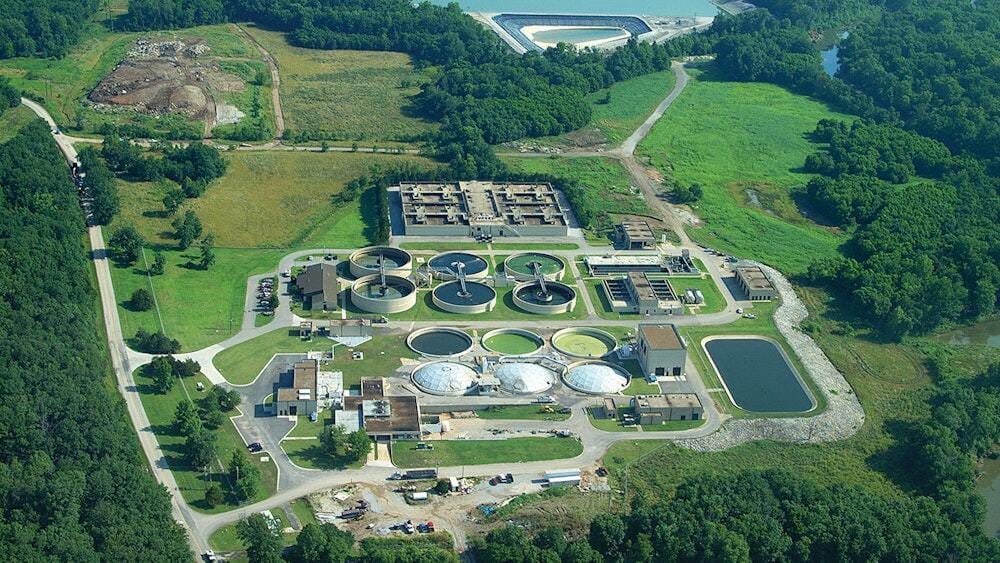
Paul R. Noland Wastewater Treatment Plant in Fayetteville
As Northwest Arkansas continues to grow at a record pace, conversations around roads, housing, and economic development often dominate headlines. But beneath the surface—literally—is a critical piece of infrastructure that could determine the future shape of our region: wastewater. I sat down with Dan Smith, a land specialist with Colliers Arkansas and longtime advocate for better infrastructure planning, to talk about what’s really going on with sewer systems in NWA—and why it matters more than most people think.
Tad: I’ve seen some of your recent posts about how NWA is growing and the work you do in land brokerage and development. What do you see as the biggest growth challenges in NWA?
Dan: Well, it’s not exactly the most glamorous topic, but I believe one of the biggest limiting factors in how our region grows is sewer infrastructure. While people get excited about new roads that reduce commute times, sewer systems often go unnoticed. I’ve been talking about this for a few years now, and I really think it needs to be a bigger part of the conversation.
Tad: To be honest, I’ve never really thought about the sewer as a major factor. What does that entail, and why does it matter? Is it just old pipes or something more?
Dan: It’s a bit complex because NWA actually has multiple sewer systems. But there isn’t a single comprehensive map showing how they inter-relate. I’ve had to learn multiple GIS platforms just to help developers figure out what’s possible. Some of the biggest issues are undersized sewer lines that can’t handle new development, areas with no sewer at all, and treatment plants that are already maxed out.
Most sewer systems were built to stay within city limits—but wastewater doesn’t exactly follow the rules. It just flows wherever gravity takes it. So when a development crosses into another city’s boundaries, it can trigger a whole mess of separate regulations and approvals. That adds time, cost, and complexity for developers trying to make a project work.
Tad: So what happens when the sewer can’t keep up? Like, how does that affect what actually gets built—or doesn’t get built?
Dan: A lack of sewer infrastructure can lead to:
Lower-density development, encouraging urban sprawl.
Increased reliance on septic systems, which isn’t ideal for large-scale growth.
Uneven development patterns, where some areas have extensive sewer access while others, even in prime locations, do not.
Take Bentonville, for example—they’ve got sewer lines that run all the way to XNA (Northwest Arkansas National Airport), but some infill areas in other municipalities lack proper lines.
In places like Centerton and Decatur, projects have stalled because of limited treatment capacity or undersized lines. We’re talking about thousands of homes and apartments that could be built but aren’t just because the sewer can’t support them.
Tad: I imagine most people, like myself, when thinking about the region’s housing problems, wouldn’t first jump to the sewers as a roadblock. It’s something I sort of take for granted since it’s literally under the surface. Does this only affect new development prices or affect the broader housing market?
Dan: It affects everything. When you can’t build enough housing, prices go up. Rent goes up. We’ve got around 36 people moving to NWA every day, and if supply can’t keep up with demand because of infrastructure constraints, affordability takes a hit.
This also impacts commercial development, which cities rely on for sales tax from retail and restaurants to fund things like parks, roads, and—ironically—more infrastructure. But if you can’t run sewer lines to support new businesses, you’re stuck. And here’s the kicker: cities typically break even, or even lose money, on water and sewer service to residential areas. So, without the commercial piece, it’s hard to fund the upgrades you need to grow responsibly.
Tad: So what’s it going to take to fix this? Is there a plan—or at least a path forward?
Dan: Yes, thankfully. The Northwest Arkansas Council has an Infrastructure Work Group, led by Rob Smith, and they’re starting to take this seriously. Senator Bart Hester is also helping push the issue.
We need a regional sewer study to find the weak spots and figure out where collaboration makes sense. Some possible solutions include issuing bonds, charging impact fees to developers, creating improvement districts where developers build the sewer and recover costs over time, or forming a regional sewer authority kind of like what other states do.
There’s also a bill, House Bill 1681, that would create grants to help with water and sewer upgrades. This is a proposed bill that has not passed yet and it could also have a positive effect.
Everyone wants responsible growth in NWA, and sewer infrastructure will be a key factor in shaping the region’s future. Most people outside of real estate don’t think about this issue, so thanks for helping raise awareness.
Tad: Anything else people should know about?
Dan: Just that this is a complex issue, but we’re not starting from scratch. We’re in a better spot when it comes to water infrastructure—getting water to homes and businesses is usually easier than dealing with wastewater, although Bentonville has been in the news lately about the water issues they are having. I’m optimistic that with more attention from local and state leaders, we can make real progress.
If anyone wants to learn more, there’s a ULI Spring Symposium on April 25 that will include water and sewer discussions. Registration should open the week of March 17 on the Northwest Arkansas Urban Land Institute website.
About Dan Smith: Dan Smith is a land specialist with Colliers Arkansas in Rogers, AR. A broker since 2009, he serves on the management committee for the Northwest Arkansas chapter of the Urban Land Institute and holds a Master’s degree in Real Estate Development. #DanTheUrbanLandMan
